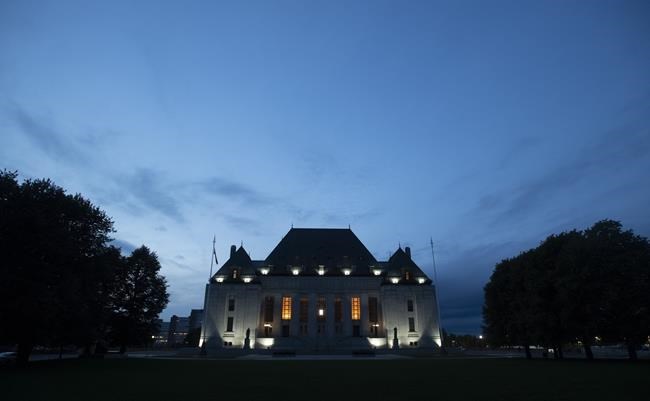OTTAWA — A defamation lawsuit brought by a school trustee against a teachers' union president should not proceed, the Supreme Court of Canada said Friday in a ruling that underscores the importance of protecting expression intended to promote tolerance and respect.
Following an amendment to British Columbia's Human Rights Code in 2016, the provincial Ministry of Education directed school boards to add "gender identity or expression" as a prohibited ground of discrimination in their student codes of conduct.
The ministry also worked with others, including the B.C. Teachers' Federation, to develop an initiative to guide instruction on sexual orientation and gender identity. The goal was to encourage inclusion and respect for students who might face discrimination due to their identity or expression.
Barry Neufeld, who was a trustee in Chilliwack, B.C., published his objections to the program in 2017.
In a Facebook post, Neufeld called the initiative a "weapon of propaganda" that teaches the "biologically absurd theory" that "gender is not biologically determined, but is a social construct." He expressed support for "traditional family values" and lauded countries that "had the guts to stand up to these radical cultural nihilists."
Glen Hansman, head of the teachers' federation at the time, criticized Neufeld's comments when interviewed by the media.
Hansman, a gay man and teacher, called Neufeld's views bigoted, transphobic and hateful. He accused Neufeld of undermining safety and inclusivity for transgender and other 2SLGBTQ+ students and questioned his suitability for the elected position of trustee.
Hansman's remarks prompted Neufeld to bring a defamation claim.
Hansman successfully moved to have the claim dismissed under the province's anti-SLAPP law, which is intended to safeguard debate of public issues.
The provision allows a judge to dismiss such a defamation claim unless the plaintiff can show the action has substantial merit, the defendant has no valid defence and the harm to the plaintiff as a result of the defendant's expression outweighs the public interest in protecting that expression.
A judge found that Hansman had a valid defence on the basis of fair comment and that the value in protecting his expression outweighed any harm to Neufeld.
However, the B.C. Court of Appeal reinstated the defamation proceeding, saying the judge erred in assessing whether there was likely a valid defence of fair comment and in weighing the competing public interests. It also said the judge failed to consider the chilling effect Hansman's remarks could have on public discourse.
In its 6-1 decision Friday, the Supreme Court restored the original order dismissing the defamation action.
In writing for the majority, Justice Andromache Karakatsanis noted that Neufeld argued he only criticized a policy and did not express hatred towards the transgender community, nor did his words create an unsafe school environment for transgender students.
"But his submissions miss the mark," Karakatsanis wrote. "Mr. Neufeld's right to criticize a government initiative is not in dispute. Rather, the central issue is whether Mr. Hansman had a right to respond to Mr. Neufeld in the way he chose without the threat of civil liability. In my view, he did."
The first judge was entitled to dismiss the action on the basis of the fair comment defence, she said. Further, the public interest in protecting Hansman’s expression is not outweighed by the limited harm to Neufeld.
"Mr. Hansman's words were not a disproportionate or gratuitous response to Mr. Neufeld's statements, and there is a substantial public interest in protecting his counter-speech.
"Mr. Hansman spoke out to counter expression that he and others perceived to be discriminatory and harmful towards transgender and other 2SLGBTQ+ youth — groups especially vulnerable to expression that reduces their worth and dignity in the eyes of society and questions their very identity," she wrote.
"Not only does protecting Mr. Hansman's expression preserve free debate on matters of public interest, it also promotes equality, another fundamental democratic value."
The B.C. Teachers' Federation welcomed the ruling, saying counter-speech plays an important role in a healthy society.
In a statement released by the federation, Hansman said he hoped it would make things easier for anyone speaking in defence of a marginalized community, "without having to be fearful of retaliatory legal action."
This report by The Canadian Press was first published May 19, 2023.
Jim Bronskill, The Canadian Press



